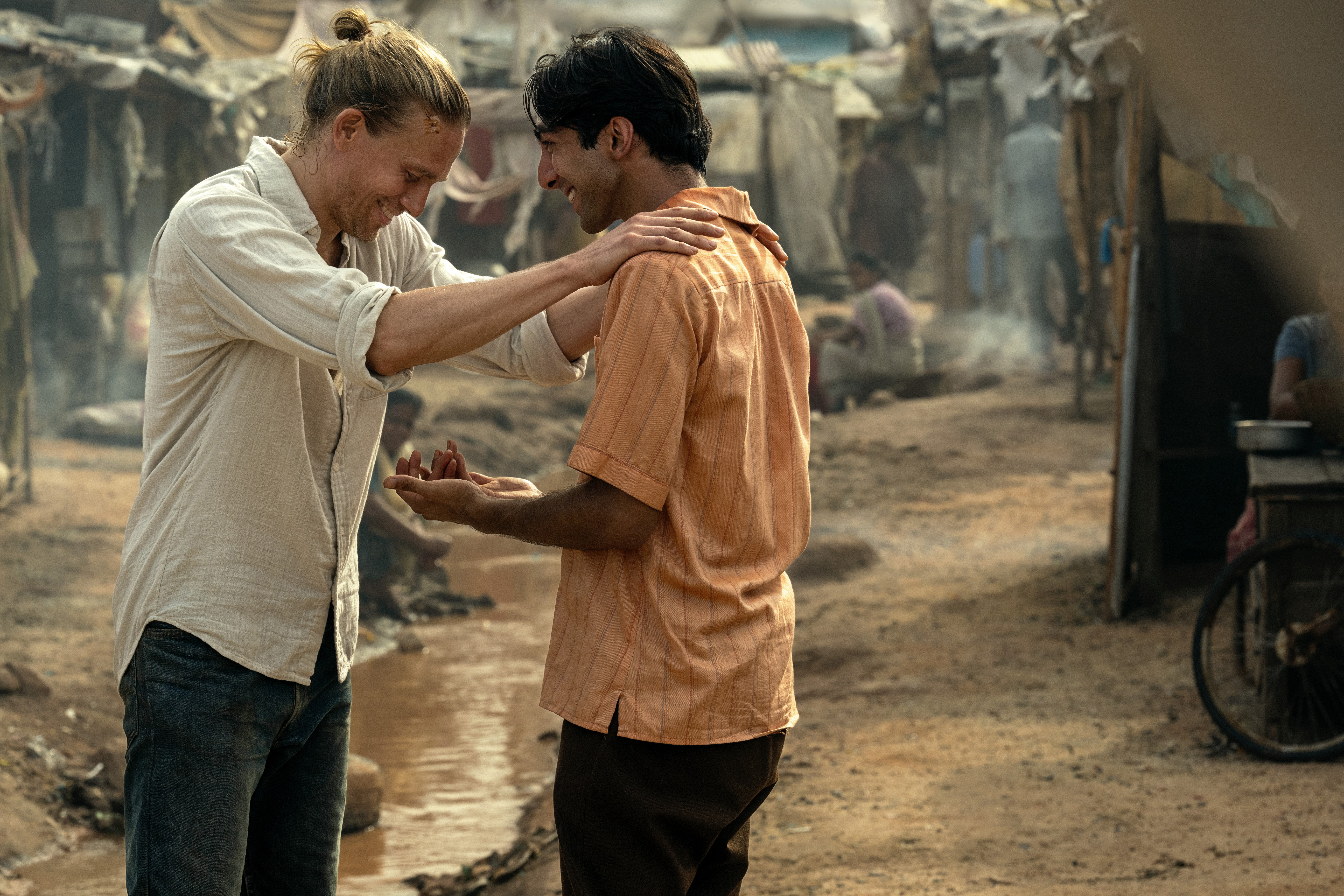Shantaram: The incredible true story behind the outlaw epic
Former bank robber Gregory David Roberts escaped from an Australian prison in 1980 and fled to Mumbai where he worked as a doctor in the slums and became embroiled with the Indian mafia. He speaks to Kevin E G Perry about life on the run, turning his experiences into a bestselling novel and being played by Charlie Hunnam in the new Apple Plus series


Your support helps us to tell the story
From reproductive rights to climate change to Big Tech, The Independent is on the ground when the story is developing. Whether it's investigating the financials of Elon Musk's pro-Trump PAC or producing our latest documentary, 'The A Word', which shines a light on the American women fighting for reproductive rights, we know how important it is to parse out the facts from the messaging.
At such a critical moment in US history, we need reporters on the ground. Your donation allows us to keep sending journalists to speak to both sides of the story.
The Independent is trusted by Americans across the entire political spectrum. And unlike many other quality news outlets, we choose not to lock Americans out of our reporting and analysis with paywalls. We believe quality journalism should be available to everyone, paid for by those who can afford it.
Your support makes all the difference.In the opening moments of the new Apple Plus series Shantaram, Charlie Hunnam breaks out of prison the fast way. Not for him chipping away at a dank tunnel for 17 years like Tim Robbins in The Shawshank Redemption. He’s over the front wall and away before the guards in the machine gun towers even turn their heads. It’s an audacious, brazen escape, and at one o’clock on a July afternoon in 1980, it’s exactly how convicted bank robber Gregory David Roberts broke out of Melbourne’s Pentridge Prison. “If you’re planning an escape, you look for the place that’s least protected,” explains Roberts, now 70, at home in Jamaica. “They thought no one would be crazy enough to escape over the front wall.”
Today, Roberts looks more like a blissed-out holy man than either a bank robber or the bestselling author he became when Shantaram,an epic 936-page novel based on his own life, was published in 2003. It went on to sell more than 7 million copies worldwide. Greeting me topless except for a bright yellow and green scarf slung loosely around his neck, he still seems spry enough to scale a prison wall if it really came down to it. His hair is cropped short; the bright red streak of a tilaka splits his forehead in two. The Hindu marking, symbolising a spiritual third eye, goes well with his beatific smile.
It’s hard to overstate the transformative impact India had on Roberts as a young fugitive. He arrived in Mumbai, then called Bombay, on a forged passport shortly after his daring prison escape. He expected to stay for two days before travelling on to Germany. In the end, he was there for eight years, living for 18 months in the slums and establishing a medical clinic before finding himself drawn inexorably into the treacherous world of organised crime. Shantaram is a savage journey into the Indian underworld, but it’s a spiritual quest for redemption too. “That’s a reflection of the life I was in,” explains Roberts. “While I was committing crimes with a branch of the South Bombay mafia, I found that gangsters are very superstitious. They’d say to me, ‘I just met this holy man up in the hills and he gave me an amulet to protect me from bullets’. I’d get on my bike and go and find these different holy people, bring them hash and fruit, and from each one gain some little insight.”

Roberts’ own life of crime had begun in Australia in the late Seventies, after his marriage collapsed and he lost custody of his daughter. He developed a heroin addiction and turned to bank robbery to finance his habit. His nickname in the press was the “Gentleman Bandit” because he wore a three-piece suit and displayed unusually good manners. “One paper ran a picture of the three ladies in the bank, and they were smiling and saying, ‘He was so polite, we don’t mind if he comes back again’,” recalls Roberts. “But there’s nothing gentlemanly about stealing money, of course.”
He was arrested in 1978 and spent two years inside before his escape. When he left Australia, one of the few things he had with him was a substantial first aid kit. “My friends knew I was a fugitive,” he recalls. “They wanted to help.” Later, when a huge fire broke out in the slums where Roberts was living, that first aid kit became the beginnings of a medical centre. “I pulled out the first aid kit and started treating people,” remembers Roberts. “The next morning, they were saying, ‘Doctor, your patients are ready to see you’. I wasn’t a doctor or a nurse, but I knew how to put a splint on a broken leg and how to treat various cuts and injuries, so I just started doing it.” While life in the slums was tough, Roberts was moved by the community he found there. “There’s a lot that slum life and slum dwellers have to teach the more fortunate community outside,” he says. “It’s desperately difficult, but at the same time astonishingly unified in terms of kindness to one another.”
In 1990, after a decade on the run, Roberts was finally recaptured in Frankfurt. He spent 19 months in solitary confinement before being extradited to Australia. Back in prison, he began work on turning the extraordinary events of his life into a novel. Twice, the manuscript he was writing was torn up by a prison guard. “Everyone who’s ever been in prison, in a tough prison, will tell you that your property is routinely destroyed,” explains Roberts. “It was one particular guard who ripped up my work, and I met him again after the book was published and it was one of the best experiences of my life.”
Signing books for a long line of fans at the Melbourne Writers Festival, Roberts looked up to see the guard who’d tormented him. “I said, ‘Hey!’ and put my hand out to shake his and he flinched,” he recalls. “Then he said, ‘Look, I’m really sorry for what I did. I don’t even know why I did it’. Tears came into his eyes, so I grabbed him and hugged him. Then I said in his ear, ‘Don’t worry. It’s a way better book now. Think of it as a really tough edit!’ He looked at me and said, ‘Seriously?’”
After Roberts reassured the guard that he’d forgiven him, the man told him he’d quit the job he hated and was now taking a computer course. Two years later, they met again at the same festival. The former guard revealed he’d developed an app and sold it for a life-changing figure. “He walked in wearing this fantastic cashmere coat and said, ‘I’ve made a lot of money, is there a charity you’d like me to donate to?’” remembers Roberts. “Forgiving him, seeing him accept that forgiveness and then bounce from that and have a catalytic reaction so that he’s thriving was unforgettable.”
Soon after Shantaram became a bestseller, Johnny Depp’s love of the book and desire to star in an adaptation convinced Warner Brothers to option the movie rights. Roberts used some of the proceeds to return to the slums and pay for life-saving operations such as kidney transplants and treatment for HIV-Aids and tuberculosis for those still living there. Meanwhile, the film itself languished in development hell for almost two decades before being revived as a 12-episode series by Apple Plus. Roberts says he’s taking a hands-off approach to the adaptation and is yet to see the show, but star Charlie Hunnam did spend several days with him in Jamaica. He says he found a kindred spirit in the actor. “I wish that in my young life I’d been more like Charlie, because I know I’d have avoided so much harm that I did to others and myself,” says Roberts. “He’s an inspiration, a terrific actor and a profoundly spiritual man as well.”
As he prepares for his epic outlaw tale to reach a new audience, Roberts says he always had faith his story was worth telling. It was that belief that kept him going, even after his manuscripts had been destroyed and he knew he had to start over from the beginning. “I always thought that a publisher might say yes, and that a movie or TV production company might want it,” he says. What he wasn’t prepared for were the letters that began to flood in from readers around the world. “People started writing to me in their hundreds, their thousands and then their tens of thousands saying, ‘This book changed my life’,” he says. “I got a lot of letters from soldiers serving on the front lines for different armies, prisoners and prison guards. They said, ‘Thank you for showing a so-called tough guy who loves deeply’. That was the unexpected result, and that’s still happening.”
‘Shantaram’ is on Apple Plus from 14 October



Join our commenting forum
Join thought-provoking conversations, follow other Independent readers and see their replies
Comments